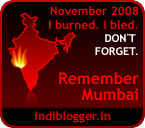Do we know how to handle any medical emergency? Do you know CPR, do you have a basic knowledge of how to tackle burns, injuries, fractures, etc? Or how to assess a bullet wound? You dont need to be a doctor, just a lay person, who has taken the trouble to educate his or herself.
Ask your family doctor for a basic lesson in first aid. Check if your local hospitals offer free or paid for first aid and emergency medical situation workshops.
Little information you know could be the vital difference between life and death.
In situations like terrorist attacks, if you have been shot, but the bullet doesnt hit a vital organ, you could still pull through if you donot suffer from excessive blood loss. If anyone else around you is injured, you should know the basics of CPR, how to make a tourniquet to stem blood loss, or to maximise chances of survival till medical assistance reaches you.
I also strongly urge hospitals to conduct short emergency first aid workshops in their cities for all citizens who are keen on learning, to enable citizens take care of themselves or the injured person in the vital initial period after the injury.
An important point: Never move anyone who is unconscious or has struck his head or was
injured in a car crash, unless he or she is in danger.
Also, have on your person, a card detailing any chronic ailments or allergies or illnesses like diabetes, bloodpressure, thalassemia etc, so that any treatment can be carried out with knowledge of these illnesses if you are unconcious.
And lastly, keep yourself physically and mentally fit. This means working out, exercising, working out, eating healthy and living healthy. Your body has more of a fighting chance if it is fit to begin with, should you be unfortunate to get into such a situation.
Some tips from http://www.emergencypreparednesstips.org/
How to Handle an Emergency Situation
Remaining Calm during an Emergency Situation
If you are faced with an emergency situation, the most important thing that you need to remember is to stay calm. It is usually easier said then done, but panicking will accomplish nothing and may cost you valuable time. If you panic, you risk complicating an already bad situation by making it even worse, so each and every emergency situation needs to be handled calmly.
Staying Calm and Collected
When faced with an emergency situation, remaining calm and collected can have a beneficial result for everyone involved. Remaining calm will help medical personnel to respond more quickly. If you are panicking during an emergency situation, it will take longer for you to call emergency personnel and relay important information to them and they may not be able to understand what you are saying. If you remain calm you can clearly explain what first aid care sick or injured individuals might need.
Time is usually crucial when administering emergency medical care. If there is a medical situation that you cannot remedy or help, at least your quick and calm contact with a 9-1-1 operator can help medical technicians get there sooner. If you panic, you will definitely complicate an already stressful situation because people surrounding you are also likely to panic if they see you upset. (the 911 is not applicable in India, but we have a medical emergency number in Mumbai, Accident cases only: 102 and Heart Attack: 105 ).
No amount of knowledge or training can adequately prepare you to handle an emergency situation. The real test of whether or not you handle the situation correctly won’t occur until you’ve actually experienced an emergency. Sometimes individuals who always assumed they would panic when faced with a crisis are able to remain calm when an emergency actually occurs.
If you want the best chance of remaining calm in an emergency situation, practice what you would do if an emergency should occur. Run drills with your family and enact different scenarios each time. What would you do if you were trapped in the basement after a tornado? What would you do if there were a flood rushing your way? How would you react if you were trapped in your home and a family member was injured or ill? By practicing different drills, you’ll be better prepared should the situation occur.
It doesn’t really matter what emergency situation you are faced with -- remaining calm is always important if you want the best possible outcome. Always keep in mind that you need to remain level-headed during a crisis and that an emergency will be handled best without hysteria and excitement.
Read this:
http://www.ehow.com/how_2109684_handle-medical-emergency.html
And this link for all the emergency medical help numbers we hope you never need:
http://theory.tifr.res.in/bombay/amenities/telnumbers.html
Tuesday, December 2, 2008
Subscribe to:
Post Comments (Atom)






2 comments:
Keep up the good work Kiran. It takes a lot of calm and patience to be able to think rationally and keep your head in such chaos. Your blog and your efforts to do something beyond the usual candle-lit rallies, is commendable.
Jasmine: Thank you so much.
Post a Comment